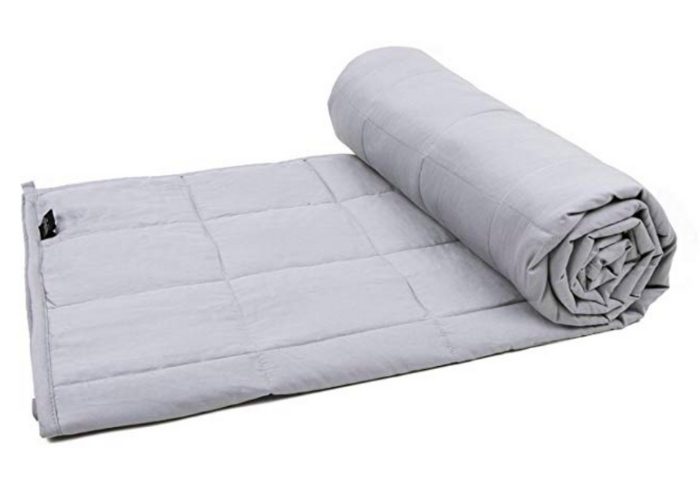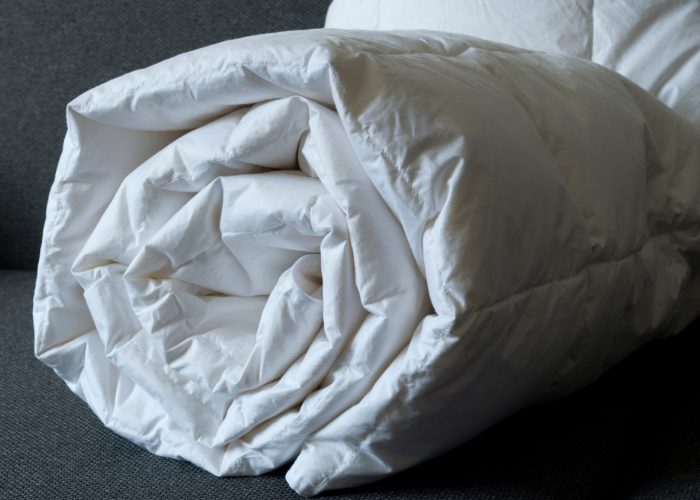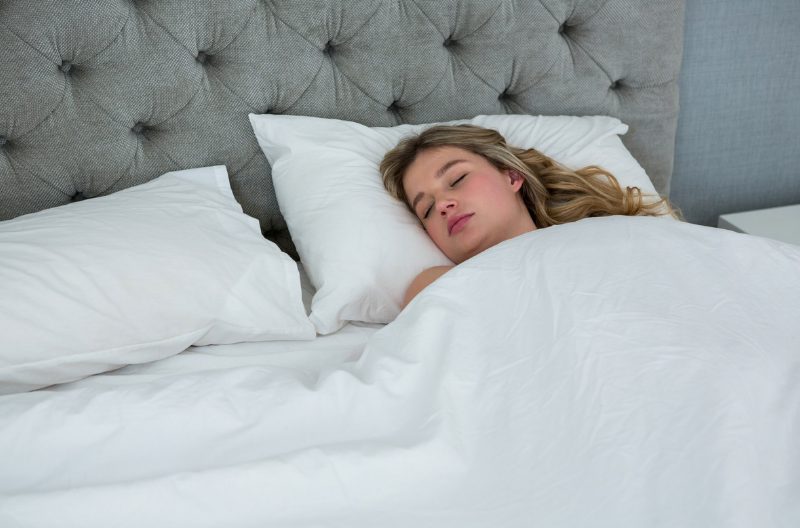Shakespeare, Blake, Wordsworth, Keats, Dickinson. They have all written poems and odes to one of our most beloved pastimes and luxuries: sleep. And, all before weighted blankets!
So, what do weighted blankets have to do with anything? They are the latest sleep trend, and everyone seems to be trying them. But what even are they? And do they really help you sleep better?
They have been called different names, including gravity blankets, earthing, and deep touch pressure. They come with different weights, sizes, and materials, and are marketed to give all kinds of people a great night’s sleep.
“We are such stuff
As dreams are made on, and our little life
Is rounded with a sleep.” – Shakespeare, The Tempest
So, we set on an investigation to explore the evidence of weighted blankets benefits for adults. After all, the notion of a big hug in a blanket is appealing and comforting. But a
We’ve compiled all of that information here and more, as a sort of shakedown on the whole debate. We have included a list of their benefits as well as their downsides. We also address some variables to help you answer the question of whether you want to jump on (or under!) this trend. You’ll find the answers to all of your questions here!
What is a Weighted Blanket for Adults?

Image credit: Amazon
Weighted blankets for adults are special blankets with weights sewn into them. Also known as “gravity blankets,” they are specially designed to offer Deep Pressure Touch (or DPT). DPT is a form of occupational therapy using firm holding, stroking, hugging, and squeezing, to calm and relax. This firm hugging releases serotonin and dopamine in our brains to help us relax.[1]
Gravity blankets claim to benefit a wide variety of health conditions. For example, there are claims that they help adults with autism, anxiety, and insomnia. In fact, the claims for their use and benefit are growing wider and more varied as these blankets grow in popularity. Now, claims of their benefits include helping with OCD, ADHD, fibromyalgia, PTSD, and depression, as well as coronary heart disease and rheumatoid arthritis.
Fun Fact: Weighted blankets are just large enough to cover your body, but not the entire bed. If they’re too large, they can easily slide off the bed due to their weight, or make you feel claustrophobic.
The weights in a weighted blanket are made of different things such as chains, sand, or wooden, steel, or glass beads. According to the National Autism Resources Advisory Board, your weighted blanket should be around 20% of your body weight.[2]
Gravity blankets provide a form of DPT therapy. One major claim about is that they feel like a big, warm hug, which is what helps you to feel relaxed.
Why is Everyone Talking About Them?

40 million adults in the United States have anxiety, and between 50 and 70 million Americans have sleep disorders.[3], [4] Additionally, more than 3.5 million Americans live on the autism spectrum.[5] With weighted blankets for adults being touted as a new non-medicated remedy to these mental health issues, it’s no wonder we’re all talking about it.
Unlike medicines, weighted blankets have no potential for addiction. There are also no additional health care costs you need to incur with doctor consultations, prescription medications, or treatments. Moreover, a weighted blanket is just a one-time purchase (which may even come with a 30-day trial period). This makes it an incredibly affordable investment compared to long-term medical visits and medications.
Fun Fact: A study done on weighted blankets for anxiety with dental patients found that the deep pressure touch provided by weighted blankets eliminated all anxiety in 93% of patients.
Another part of their allure is the fact that they might actually work! Many people with insomnia never visit their doctor.[6] We may struggle for years with insomnia before we consider it to be a real problem. This is, in fact, one reason why so many people are talking about them.
The media talks about how they help with sleep problems related to everything from autism and anxiety to PTSD, cardiovascular disease, and rheumatoid arthritis.
Celebrities have also sparked interest in them. For example, Kourtney Kardashian recently posted a mini-endorsement on Instagram for her favorite weighted blanket with the comment, “Keeping up with the #BlanQuils.” With celebrities talking about them, how can we not be intrigued?
Do Weighted Blankets for Anxiety and Insomnia Actually Work?

Weighted blankets for anxiety and insomnia have a proven track record. Several studies about them have had encouraging results.
In one study, researchers studied patients in a mental hospital, all of whom were undergoing acute distress. The researchers gave patients gravity blankets, then observed their vital signs. They found that the weighted blankets decreased patients’ blood pressures and heart rates by 33%.[7] Additionally, there were decreased symptoms of anxiety in 63% of the participants, and 70% of the patients declared that they felt less anxious due to the use of weighted blankets in their exit surveys.[8]
Another study on weighted blankets for anxiety was studied specifically during a dental exam. The study found that the deep pressure touch provided by weighted blankets eliminated all anxiety in 93% of patients.[9]
Fun Fact: According to the National Autism Resources Advisory Board, your weighted blanket should be around 20% of your body weight.
The value of weighted blankets for insomnia also has scientific support. The Journal of Sleep Medicine and Disorders supplied weighted blankets for insomnia to 31 participants.[10] Using the gravity blankets, the participants exhibited better, calmer sleep. The blankets also helped decrease movement throughout their sleep cycles, meaning they got more restful sleep.[11] Additionally, the participants claimed better, more comfortable sleep, and also noted feeling more secure during sleep.[12]
While more research needs to be conducted on the value of weighted blankets for anxiety and insomnia, the internet is afire with word of their virtues. You may have even heard your friends wax lyrical about them. Due to their popularity, there are now all kinds for adults (as well as for children) made in different sizes, fabrics, weights, as well as various price points.
What Are Some Benefits of Using Them?
Obviously, weighted blankets for adults are compelling. Below are some of their touted benefits:
1. Reduces symptoms caused by autism

Occupational therapists have been using weighted blankets on children with autism for years. But now, gravity blankets for autism are mainstream and targeted at adults too. Multiple studies show that they reduce anxiety, OCD, and tension in people with autism.[13] And, research has found that weighted blankets for autism encourage better sleep, which results in better functioning during the day.[14]
2. Helps with ADHD

Weighted blankets for ADHD helped improve sleep in ADHD patients, which affected subsequent daytime behavior.[15] In one 15-month study, adults with ADHD were provided 74 different treatment tools for their ADHD. The subjects chose weighted blankets for ADHD among the three most valued technologies. Specifically, subjects valued them in their daily routines and for their overall satisfaction with life.[16]
3. Calms fibromyalgia

Fibromyalgia is a chronic condition caused by the central nervous system going into overdrive. It sends consistent pain neurotransmitters throughout the brain.[17] The result is pain throughout the muscles, joints, and tissues, as well as all over the body. While no studies have been conducted on weighted blankets for fibromyalgia, their ability to calm the central nervous system makes them a good remedy for this condition.[18] Additionally, the automatic release of serotonin and the DTP sensory touch provided by weighted blankets are therapeutic for fibromyalgia. They also induce better sleep, which is a chronic problem for sufferers.
4. Alleviates some forms of depression

Depression is a common symptom associated with insomnia or sleep disorders. While no studies have been conducted regarding the relationship between weighted blankets and mood disorders, they have been shown to support a feeling of calmness and peacefulness.[19] The deep pressure touch simulated by a weighted blanket helps the body’s release serotonin and dopamine in the brain.[20] When low to moderate pressure is applied to specific areas of the body (for example the back, neck and shoulders), it changes the body’s chemistry.[21] Specifically, it decreases cortisol, the stress hormone, and increases serotonin and dopamine.[22] They are the brain’s neurotransmitters of relaxation, happiness, and well-being.
5. Helps with post-traumatic stress disorder (PTSD)

Sleep disturbances are the hallmark of PTSD.[23] For example, bad dreams, disruptive behaviors, acting out dreams, and sleep-disordered breathing are common among those with PTSD. But, with weighted blankets, PTSD patients slept better.[24] Subsequently, the good sleep achieved by the subjects also helped reduce daytime symptoms of PTSD, anxiety, and depression in PTSD patients.[25]
6. Lowers risk of cardiovascular disease

A weighted blanket helps reduce blood viscosity, thus lowering the risk of cardiovascular disease.[26] Essentially, the grounding effect of weighted blankets regulates circadian rhythms, which promotes improved sleep with better night-time cortisol dynamics.[27] This reduces the risk of heart disease.
7. Eases pain from rheumatoid arthritis

While no studies or scientific research have yet been completed on the effects of gravity blankets on rheumatoid arthritis (RA), weighted blankets help people relax and get better rest.[28] Studies have shown that RA patients suffer greater pain when they don’t sleep.[29] And often, RA is accompanied by poor quality sleep.[30] Thus, the calmer sleep provided by weighted blankets for rheumatoid arthritis decreases additional pain from lack of sleep.
What Are Some Drawbacks of Using Them?
By now, you should be well aware of all the benefits of gravity blankets for anxiety and insomnia. But you should also be mindful of their drawbacks. Let’s take a look at some of them:
- Cost. Weighted blankets can be quite costly, with the average retail price between $75-300. When you can buy an average blanket for around $25, you have to decide for yourself if its value exceeds its considerable cost.[31]
- Bulky to use. Some weighted blanket users have noted that they are inconvenient to use. They are heavy, and thus, they are naturally bulky items. They may be difficult to fold and store on higher shelves. Additionally, you cannot carry them around conveniently or taken along while traveling.
- Weights may not be user-friendly. The chains or beads used as weights are cold when you first use the blanket. So, you may find them slightly uncomfortable until they are warmed up. Some users have also noted that the chains or pellets may cause the duvet to rip.
In addition, if you have any of the following conditions, you should consult with your healthcare professional before using a weighted blanket for adults.
- Respiratory problems: If you have problems breathing, a gravity blanket can cause complications. These issues include asthma, COPD, obstructive sleep apnea, or lung disease.
- Temperature regulation problems: Weighted blankets can make symptoms worse. This includes menopausal women, people with hypothyroidism, hypothermia, or heat intolerance.
- Circulatory problems: Gravity blankets, especially heavily weighted ones, can cause complications if you have a hard time circulating blood.
- Claustrophobia: The excess weight of a weighted blanket may trigger phobic episodes.
So Are Galaxy Blankets Worth the Cost, Or Are They Just Another Fad?

Weighted blankets have a lot of momentum right now. Their surge in popularity is due mostly to the fact that many of us suffer from insomnia and anxiety. Yet, only some of us seek medical attention for these woes.[32]
Gravity blankets may not be a cure for these conditions, but they can help. The benefits of calmer and better sleep help remedy everything from autism to heart disease and rheumatoid arthritis. However, the hype is mostly unscientific with sparse research or methodology.
Exceptionally, there are studies on gravity blankets for autistic children. But, in those situations, gravity blankets are used only for a short time while under the watchful eye of a licensed therapist. And, most often, these situations study autistic children, rather than adults at home using the blanket all night.
Thus, the decision whether to invest in a weighted blanket for anxiety or insomnia is a personal one. But, it does not have to be decided alone. If you talk with your doctor and receive a prescription for a gravity blanket, your insurance may cover its cost.

Conclusion
All in all, weighted blankets for adults have the potential to help you achieve a better night’s sleep in a relatively simple manner. It seems to be a worthwhile investment, especially if it works. And, if it saves you time and money on doctors and prescriptions, it may be worth the cost.
A weighted blanket for anxiety and insomnia may provide a partial or total solution to these conditions. And, if not, perhaps it’s worth trying and seeing for yourself?
References
- [1] https://www.ncbi.nlm.nih.gov/pmc/articles/PMC5612681/
- [2] https://www.nationalautismresources.com/blog/how-much-weight-should-your-weighted-blanket-have/
- [3] https://adaa.org/about-adaa/press-room/facts-statistics
- [4] https://www.sleephealth.org/sleep-health/the-state-of-sleephealth-in-america/
- [5] http://www.autism-society.org/what-is/facts-and-statistics/
- [6] https://www.mayoclinic.org/diseases-conditions/insomnia/diagnosis-treatment/drc-20355173
- [7] https://www.tandfonline.com/doi/abs/10.1300/J004v24n01_05
- [8] https://www.tandfonline.com/doi/abs/10.1300/J004v24n01_05
- [9] http://www.jmbe.org.tw/files/1961/public/1961-5094-1-PB.pdf
- [10] https://pdfs.semanticscholar.org/7b52/514a1b040f0b631168d98cfa9730cfc5a9dd.pdf
- [11] https://pdfs.semanticscholar.org/7b52/514a1b040f0b631168d98cfa9730cfc5a9dd.pdf
- [12] https://pdfs.semanticscholar.org/7b52/514a1b040f0b631168d98cfa9730cfc5a9dd.pdf
- [13] http://www.sensisereni.it/wp-content/uploads/2016/04/Safety-and-Effectiveness-of-the-Weighted-Blanket.pdf
- [14] http://www.sensisereni.it/wp-content/uploads/2016/04/Safety-and-Effectiveness-of-the-Weighted-Blanket.pdf
- [15] https://www.researchgate.net/publication/303850918_G594P_The_Use_of_Weighted_Blankets_to_Modify_Sleep_in_Attention_Deficit_Hyperactivity_Disorder_ADHD
- [16] https://www.ncbi.nlm.nih.gov/pubmed/23992459
- [17] https://www.mayoclinic.org/diseases-conditions/fibromyalgia/symptoms-causes/syc-20354780
- [18] https://www.sensacalm.com/blogs/news/can-a-weighted-blanket-help-with-fibromyalgia-symptoms
- [19] https://www.psychologytoday.com/us/blog/two-takes-depression/201812/weighted-blankets-and-depression
- [20] https://www.researchgate.net/publication/233228002_Exploring_the_Safety_and_Therapeutic_Effects_of_Deep_Pressure_Stimulation_Using_a_Weighted_Blanket
- [21] http://sitn.hms.harvard.edu/flash/2016/research-into-our-sense-of-touch-leads-to-new-treatments-for-autism/
- [22] http://sitn.hms.harvard.edu/flash/2016/research-into-our-sense-of-touch-leads-to-new-treatments-for-autism/
- [23] https://www.ncbi.nlm.nih.gov/pmc/articles/PMC4197954/
- [24] https://www.ncbi.nlm.nih.gov/pmc/articles/PMC4197954/
- [25] https://www.ncbi.nlm.nih.gov/pmc/articles/PMC4197954/
- [26] https://www.liebertpub.com/doi/pdf/10.1089/acm.2011.0820
- [27] https://www.liebertpub.com/doi/pdf/10.1089/acm.2011.0820
- [28] https://pdfs.semanticscholar.org/7b52/514a1b040f0b631168d98cfa9730cfc5a9dd.pdf
- [29] https://www.ncbi.nlm.nih.gov/pmc/articles/PMC4591615/
- [30] http://www.scielo.br/scielo.php?script=sci_arttext&pid=S0482-50042017000400294
- [31] https://www.walmart.com/ip/Ultra-Soft-Microplush-Velvet-Blanket-Luxurious-Fuzzy-Fleece-Fur-All-Season-Premium-Bed-Blanket-Full-Queen-Grey/664854774
- [32] https://www.mayoclinic.org/diseases-conditions/insomnia/diagnosis-treatment/drc-20355173








